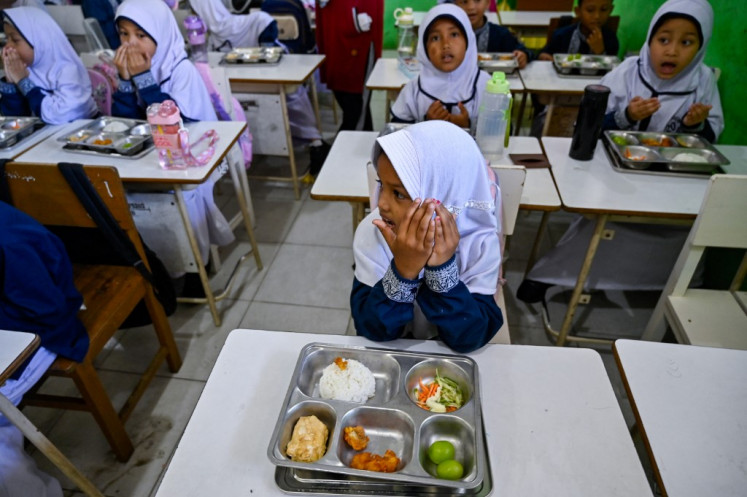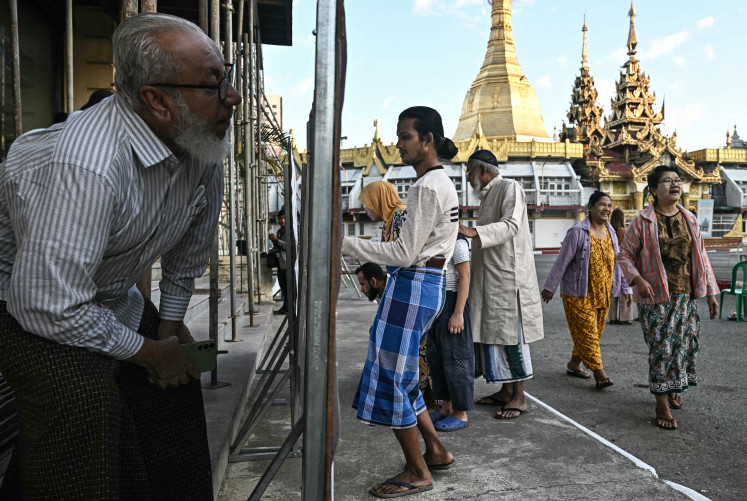Popular Reads
Top Results
Can't find what you're looking for?
View all search resultsPopular Reads
Top Results
Can't find what you're looking for?
View all search resultsPrivate power utilities a game changer
The costs of blackouts to seven manufacturing sectors accounting for 19 percent of GDP could be around US$415 million/year.
Change text size
Gift Premium Articles
to Anyone
I
ndonesia is targeting a 7 percent annual gross domestic product ( GDP ) growth in 2019, in order to raise its profile as a high-income country by 2019. To achieve this target, the country needs to boost the growth of the industrial sector, which accounted for 21 percent of GDP in 2014. The development of industrial estates will be critical to help build the country’s manufacturing sector and achieve this target.
Manufacturing provides long-term income and jobs and underpins a well-trodden path of economic development in many other Asian countries — first in Japan, then Korea and Taiwan and more recently in China. Indonesia’s wealth of natural resources gives it a decided advantage over some of these economies in building its manufacturing base.
The government recognizes this. President Joko “Jokowi” Widodo has announced plans to build 15 Industrial estates and 11 special economic zones. Most of these ( all but three ) are outside the traditionally more-industrialized island of Java as Jokowi aims to bring jobs and poverty alleviation to the rest of the country.
The government’s recently released economic policy packages support this objective by providing greater fiscal incentives and shortening the permitting timeline for new investors in Indonesian special economic zones to three hours.
This is a good start, but when making an investment decision, what does a manufacturing company really look for? In our experience, there are some consistent key factors; — availability and preparedness; skilled and cost-effective workforce; availability of transportation infrastructure ( ports, road and/or rail ) to get goods to market and receive supplies; consistent and transparent regulations; proximity to customers and suppliers; reliable and affordable energy.
To its credit, the government has focused hard in recent years on providing sites, accelerating infrastructure, simplifying regulations and providing incentives. Yet, power is still frequently cited as a barrier to industrial estate success.
General Electric and Pricewater Coopers have recently completed a study, “Private Power Utilities: Economic Benefits of Captive Power in Industrial Estates”, addressing the challenges of secure, stable and affordable energy for the Indonesian manufacturing sector.
As the study notes, the state electricity company PLN has made tremendous progress signing power purchase agreements and other contracting documents in the past six months, but the 35 gigawatt ( GW ) program is an enormous endeavor and keeping pace with power demand growth in a country the size of Indonesia is no mean feat. In 2014, there were 5.8 blackouts a year of around 5.6 hours each.
This is higher than in Malaysia, Thailand and the Philippines, with whom Indonesia is fiercely competing for inbound investment.
Based on projections by PLN and the Energy and Mineral Resources Ministry, the study estimates that in the event of a two-year delay in the 35 GW program, reserve margins ( or spare capacity ) could fall below 15 percent in many areas.
In addition, there are some industrial estates that the power grid may not reach anyway based on the current planned transmission and this is where private power utilities ( PPUs ) come in. PPUs ( also sometimes referred to as captive power for industrial estates ), are medium- to large-scale power plants that generate power for use by nearby companies, such as industrial estate tenants.
They may or may not make use of PLN infrastructure as well. Some industrial estates have already invested in PPUs to provide a very reliable supply of power to their tenants. In total, around 25-30 PPU concessions have been granted by the above ministry.
The findings of our study were perhaps not surprising to anyone in the manufacturing sector in Indonesia, although the “size of the prize” perhaps is. The costs of blackouts to seven manufacturing sectors accounting for 19 percent of Indonesia’s GDP could be around US$415 million/year, including avoided diesel, overtime costs and forfeited revenue opportunities during blackouts and restart periods.
Further, these estimates ignore material/inventory losses and equipment damage. This equates to around 0.9 cents per kilowatt-hour ( c/kWh ) spread over their entire power bill.
Costs are highest for the chemicals, food and beverage, and pulp and paper sectors. Given the government’s push to develop industrial estates and supporting infrastructure ( ports, roads, etc. ), we believe the time is ripe for private power investment. There is potentially around 8-10 GW of new power demand in industrial estates needing to be met in the next few years.
If we were to speculate, we would guess that the PPU market will boom in the next few years. Key drivers include increased power demand and a more streamlined regulatory environment and increased ease of permit acquisition.
We believe that we will see an increased number of strategic ventures between real estate and power plant developers, between developers and PLN, and increased appetite for green field projects outside Java.
All of this will be of huge benefit in achieving the government’s objective of stimulating the manufacturing sector and growing the economy for the benefit of all Indonesians.
***
Handry Satriago is the CEO of General Electric Indonesia and Sacha Winzenried is lead adviser for energy, utilities and wmining at Pricewater Coopers Indonesia. The views expressed are their own.
---------------
We are looking for information, opinions, and in-depth analysis from experts or scholars in a variety of fields. We choose articles based on facts or opinions about general news, as well as quality analysis and commentary about Indonesia or international events. Send your piece to community@jakpost.com.










